CompSoc
The Oxford Computing and Technology Society (CompSoc) promotes the use of computers, programming and new technology amongst our diverse group of members from across the university – we welcome everyone!
We regularly host talks from major technology companies and academics as well as weekly social events. You can find a full list of our upcoming events on our Discord or Facebook page. Every Michaelmas Term we also run an introductory programming course in Python.
If you are interested in receiving details of our events by e-mail, you can subscribe to the CompSoc mailing list – or of course join! Members might also want to read our constitution.
If you have any general comments or questions, please email the CompSoc committee (committee@ox.compsoc.net); however, matters related to the administration of the network should be sent to our System Administrators (sysadmin@ox.compsoc.net).
History
-
The society was formed as the “St John’s College Microcomputer Society” (MicroSoc) in 1978 to provide an environment for college members to discuss, use and build microcomputers. Originally, the club used early home computer systems such as the Commodore Pet, the RML 308Z and a home-built 6800 system.
-
In 1979, the club grew into the “Oxford University Microcomputer Society”. Membership increased to over 100, and the society now had access to five machines which were used for a mixture of game playing and programming. Regular speaker meetings were arranged, covering a variety of topics, such as the Z80 instruction set and pinball design geometry.
-
In 1980, the society’s made its first major purchase – an Acorn Atom, which was subsequently expanded and improved by members. The club also bought and expanded a BBC Model B.
-
In 1985, the society gained a base in the newly installed Orion Computer Room in the Nuclear and Astrophysics Laboratory (NAPL). However, the society’s membership and bank balance fell. The society recovered over the next couple of years, organising trips to the Atari Computer Show and the Research Machines Development Centre as well as holding a number of lectures.
-
The society benefited from good relations with computer manufacturers, leading to lectures from Research Machines and Acorn, who generously donated an A3000 in 1992. In 1993, MicroSoc’s home became the NeXT laboratory in the NAPL where it promoted members’ interests in e-mail, USENET, the world wide web and programming skills. The society organised weekly information sessions, visits to computer manufactures and computer shows, maintained a small library and sold reduced-price floppy disks to its members.
-
In Trinity 1995, we were renamed to the “Oxford University Computer Society” (Compsoc) and a year later created the Compsoc Network with the donation of a Digital Pentium PC by Progress Computer Systems and two more computers. Soon after, the society completed its change of direction with an aim of giving members basic computer facilities as provided by OUCS and colleges and an emphasis on regular speaker meetings, hands-on practical sessions and social events.
-
In 1998 another machine was donated to the society by DecisionSoft Ltd and all the machines were moved to Trinity College, where space was kindly provided by Alastair Johnson, the Trinity College Computing Officer. The society continued to hold a busy calendar of events each term.
-
1999 saw a record intake of new members and the establishment of sponsorship links with industry leading to the donation of a range of computer equipment by Warburg Dillon Read. This included two Sun UltraSparc Enterprise 1 machines, one of which is currently hosted by Planet (now Energis Squared) in Leeds and provides the society with a base for running services outside the limitations of the University network.
-
The society was well prepared for the “millennium bug” and managed to keep all its data intact as we celebrated the twenty first anniversary of the society’s formation with a black tie dinner at Linacre college. 2001 saw the reintroduction of more socially orientated hands-on events, as well as a range of talks from major industry players such as Microsoft, Nvidia and AMD.
-
In 2010-2011, the Compsoc unfortunately failed to elect a committee and went on hiatus for a year, which forced the society’s name to change to the “Oxford Computing Society”. However, due to the work of of Ben Gazzard’s and Sam Lanning’s committees, the society survived with a renewed focus on providing social, networking and educational events.
-
In 2022, after COVID-19 caused the Compsoc to again almost fail to elect a committee, the society rebranded to the “Oxford University Computing and Technology Society”. Due to renewed issues with registration, the committee settled for the “Oxford Computing and Technology Society”. Regardless, the society continues to host social events, talks and Learn To Code while having introduced CTFs and competitive programming events. (And we’ll get our name back soon…)
